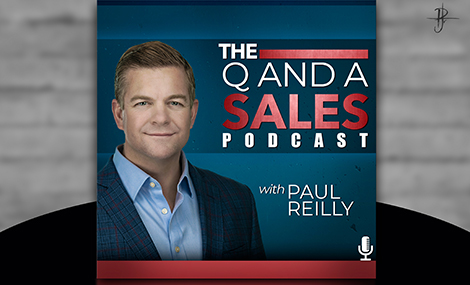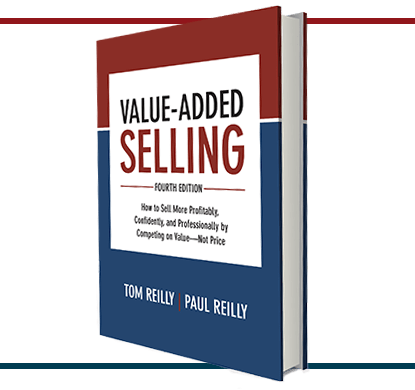Paul outlines the next decision maker in the series: technical influencers.
Show Notes
If this challenging decision maker likes your solution, they’re going to help you immensely.
“They are focused on….”
These decision makers are skeptical of salespeople and will challenge your data.
Avoid surprises, hunches, intuition, speculation. Eliminate the “human” factor.
Brand new is not the best selling feature for these technical types. “They want something that is tried and true.”
They want to partner with suppliers that are stable and are committed to excellence—like they are.
***
Learn more: https://www.theqandasalespodcast.com.
Click here to pre-order a copy of Selling Through Tough Times!
Click here to purchase the latest edition of Value-Added Selling!
Click here to get more information on our next public seminar: October 6 – 7, 2021 in St. Louis, MO.
Thanks to our production team at The Creative Impostor Studios!
Click here to book a complimentary consultation with Strategist and Producer, Andrea Klunder, to find out how to launch, produce, and grow your company’s podcast.
***
Thank you for tuning in. Our show is updated weekly with the questions you ask. So, please go to the home page to ask the question that you want answered.
Be sure to follow our show in your favorite podcast app and share this episode with a colleague or friend.
And most importantly…make it a big day.
How do I sell to technical influencers?
(Transcribed from podcast)
On today’s show, we’re going to continue our decision-maker series. And today, we are going to talk about the engineers—those technical influencers—and how they make decisions. A very, very key decision maker, especially when you’re in a technical type of sale. So, we’re going to get right into that.
Before we do, a quick shout-out to The Creative Impostor Studios, helping you become a better podcaster—I mean, that’s what they’re going to do. Whether you’re launching a podcast—starting a new one—they’ve got resources for you. They’re here for you to help you. It does not have to be as hard as we make it. So reach out to Andrea and her team. They do an absolute wonderful job. Can’t say enough great things about them. They will help you be successful on your podcast. So, reach out to Andrea over at The Creative Impostor Studios. We’re going to have a link over to her website on this episode’s webpage.
Also make sure you pick up your copy of Value-Added Selling. Value-Added Selling is available on Amazon, wherever you get your books. You know, another thing we don’t mention enough, but I conduct live public training seminars. In fact, I’ve got a live training seminar coming up in October of this year. We’re going to have it at our training center in St. Louis, Missouri. We’re going to have a link over to some more details on that. It’s a two-day event on Value-Added Selling to help you sell more profitably. So check it out. We’ll have a link over to that as well.
Let’s get back to that question: How do I sell to those technical type of influencers? This group is challenging to sell to. But if they like your solution, they’re going to help you immensely. This is the technical influencer that is really focused on compliance. You may see them in quality control, production, safety, engineering certainly, but their jobs are to make sure things comply with policies, procedures, specifications. They want to make sure things work, and that they work as they should. So, they are certainly a performance-minded type of decision maker. They amass data, they analyze it, they compute it. They strive for decisions that are fail safe. So when you think about what they’re looking for, they want a solution that’s going to comply with what is specified. Something that aligns perfectly.
They’re going to look at procedures. They want to know how you do things. Why you do certain things the way you do. They want performance data. They want quality. They want a backup system in case something doesn’t go well. So, that’s really what this decision maker is concerned about.
Now, remember, this type of decision maker, they are going to be skeptical of salespeople. And I say that because I’ve seen it; I’ve experienced it. If you’ve been in sales long enough, and you’re talking to a technical influencer, they’re going to be skeptical of salespeople. They’re going to try to challenge you a little bit, especially when it comes to your data, your testing, and your performance metrics that you’re claiming. They’re going to challenge those things because they’re skeptical. They’re not pessimistic, and I know people sometimes believe that they are. They’re not pessimistic. They’re the anchor of reality. They want to make sure that your solution performs at the level that it should perform. And you have to do that by showing data.
In fact, mentioning engineers being skeptical salespeople—. I remember, I was going out with one of my colleagues—we used to sell medical equipment together—and he was going to talk to a group of engineers. And one of the engineers said (it was meant as a joke, but if you’re in sales, you know, it’s not as funny), but here’s what the engineer said. He goes, “You want to know how we know if a salesperson’s lying when they come into our office?” And my buddy said, “Well, no. How do you know?” He said, “Their mouth is open.” Obviously, meaning everything they say is a lie. Come on now. Not all of us. You know, some of us maybe, yeah, but not all of us.
But anyway, that speaks to the skeptical nature of these individuals. So, when you think about what they really want, they want something that’s field tested. They want something that is proven, something that is practical, something that’s quantifiable, so they can use data to prove it. They want to eliminate the human factor because they know, with humans, there are going to be errors. What they want to avoid when you’re talking to them—what you should avoid—avoid too many surprises, too many of the intangibles, too many human issues to contaminate their process. They don’t like those things: hunches, intuition, speculation. I don’t think so.
I remember presenting to a group of engineers a new fastening system. And we were talking about the new fastener, and it was a very innovative product—really revolutionary, and what it could do—lot of different capabilities. And one of the engineers said, “Well, could we use it for this application?” And I said, “Yeah, probably.” And they didn’t like that. Probably was not convincing enough. And really, it shouldn’t have been either. But they saw that as, “Okay. Well, this product isn’t going to do what we want it to do.” They wanted to know if it would work for certain applications, certain specific and saying “probably,” that did not impress him. So, we had to go back to the drawing board. We actually had to do some testing with our own engineering team to make sure that it would work. We had to look for the data, the applications. We had to look for the UL listing, a certification for it.
So, before they were even convinced, I had to get past probably and get into certainty, because that’s what they were looking for. They want to make sure that it works. And other things, they’re fearful of too much exposure, experimental designs that can make them look bad, something that’s brand new. Brand new might not always be the best selling feature when you’re selling to these technical types, because they like something that is tried and true, that is tested, that is field tested and is going to work. And in fact, I remember, one of my colleagues who I used to work with. Whenever our company would launch a new product, and they would tell us, “Go try and promote this to the engineering community.” We never started with them. And the reason why was because it wasn’t field tested yet. Yeah, it was laboratory tested. We had the certification, this and that, but my colleague told me, he said, “You’re going to go in there and you’re selling to the group that is skeptical. Give the product a few months. See if there’s any kinks. And then—then you can go in there.”
Again, with this group, they don’t want make any mistakes. They have those perfectionist type tendencies. So, the products they’re looking for, stuff that’s reliable, stuff that’s tested, proven solutions to their problems. They want industry standards. They want field-tested products that are designed to eliminate the human factor. They also want to partner with suppliers who are stable—that have been in the industry for a while, that have a good reputation. They want someone who’s going to be around for a long time, that’s committed to excellence and achieving, just like they are. So, make sure that’s how you promote yourself—not only as the salesperson, but also as a company.
All right, folks. That’s how you sell to those technical influencers. They are very key. Again, once they get involved in the decision, good things can happen. If you have a technical type that is a big fan of your solution, that is only going to help your cause, especially when they have ultimate authority. There are certain cases where, again, if you’re an engineer, technical type, or systems architect, whoever it may be, you might actually have final approval or authority to make a decision. It has to pass your desk. It has to be certified by you.
So those decision makers, they have an enormous amount of influence on the buying decision. But that’s how you sell to them. You’ve got to have proven solutions: things that are going to work. Take the guesswork out and again, give them reassurance.
Make it a big day.


